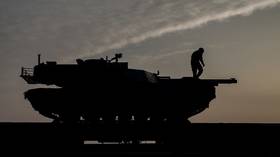Top US general in Europe cries ‘Russian threat’ to get more troops, planes & ships

Citing the phantom menace of ‘Russian aggression’ amid Washington’s withdrawal from the INF treaty, the head of the US European Command has asked the Senate for more troops, jets, missiles and ships, to ‘defend’ European allies.
Testifying before the Senate Armed Services Committee on Tuesday, General Curtis Scaparrotti argued that the US maintains global military superiority, but cited “evolving Russian capabilities” as a threat to that dominance, challenging the US “ability to operate uncontested in all domains.”
Scaparrotti, who as the head of EUCOM is also the supreme NATO commander in Europe, claimed without evidence that the Russian military posture is “increasingly aggressive” and sought aid from Congress to bolster EUCOM’s “assigned and rotational forces.”
Scaparotti also asks for more armor, more bombers, more troops, and more cyber capabilities/staff. Usual requests from a Combatant Commander.
— paul mcleary (@paulmcleary) March 5, 2019
In addition to more troops, ships, spies and everything but the kitchen sink, Scaparrotti revealed that EUCOM has requested two more destroyers from the US Navy, and maybe also an aircraft carrier, in order to counter what he said were the expanding capabilities of the Russian fleet.
The US currently has four destroyers stationed in Rota, Spain. One of them, the USS Donald Cook, recently ventured into the Black Sea to “promote stability” by posing as a live target for Russian coastal defense missiles.
Washington needs to upgrade its naval capabilities in order “to remain dominant in the maritime domain, and particularly undersea,” Scaparrotti told senators.
Also on rt.com Trump wants out of NATO: A gift to Russia, or a gift to Germany?Scaparrotti’s gloom and doom pronouncements are par for the course, however – he sang the same tune last year. The US has been bolstering its troop presence in Europe since 2015, using allegations of “Russian aggression” in Ukraine as pretext. Just last month, the 1st Cavalry and 1st Infantry divisions were sent to Eastern Europe, as part of the ongoing effort dubbed “Atlantic Resolve.”
Not surprisingly, the general’s shopping list comes ahead of the proposed 2020 US military budget, which is expected to be announced next week and is rumored to be in the range of $750 billion, up from $716 billion allocated for 2019. Meanwhile, Russia has been gradually reducing military spending to devote more funds to infrastructure, education and social programs.
Also on rt.com US destroyer enters Black Sea ‘to support regional partners’, Russia sends ship to ‘monitor’With the US national debt exceeding $22 trillion, however, the Pentagon is looking to save a few pennies here and there, so it is unclear how much Scaparrotti may eventually get. Last month, a report emerged that the Navy was considering retiring the aircraft carrier USS Harry Truman in 2024, decades ahead of its expected end of life, in order to divert money into the new Ford-class supercarrier project.
It was the Truman that ventured north of the Arctic circle in October last year – as part of massive NATO wargames on Russia’s doorstep – the first US carrier to do so since the Cold War.
Also on rt.com INF Treaty is about European security, not American; US left it to get new missiles – Russian envoyOn the actually alarming subject of the Intermediate-range Nuclear Forces (INF) treaty expiring in less than six months, Scaparrotti had little to say. Asked how EUCOM was preparing for the end of the INF, the general told senators that the US informed NATO allies that plans would be made in cooperation with them.
“So, I don’t know that we have a plan today,” he said. “I know that we are working on what we think that plan might be.”
US President Donald Trump has repeatedly complained that only a handful of NATO members were spending the agreed-upon two percent of their GDP on the military. Alarmed that the president might take the US out of NATO, the Democrats have spearheaded an effort in the US Congress to pass a bill in January banning such a move, but also demanding NATO allies boost their military spending.
Like this story? Share it with a friend!













